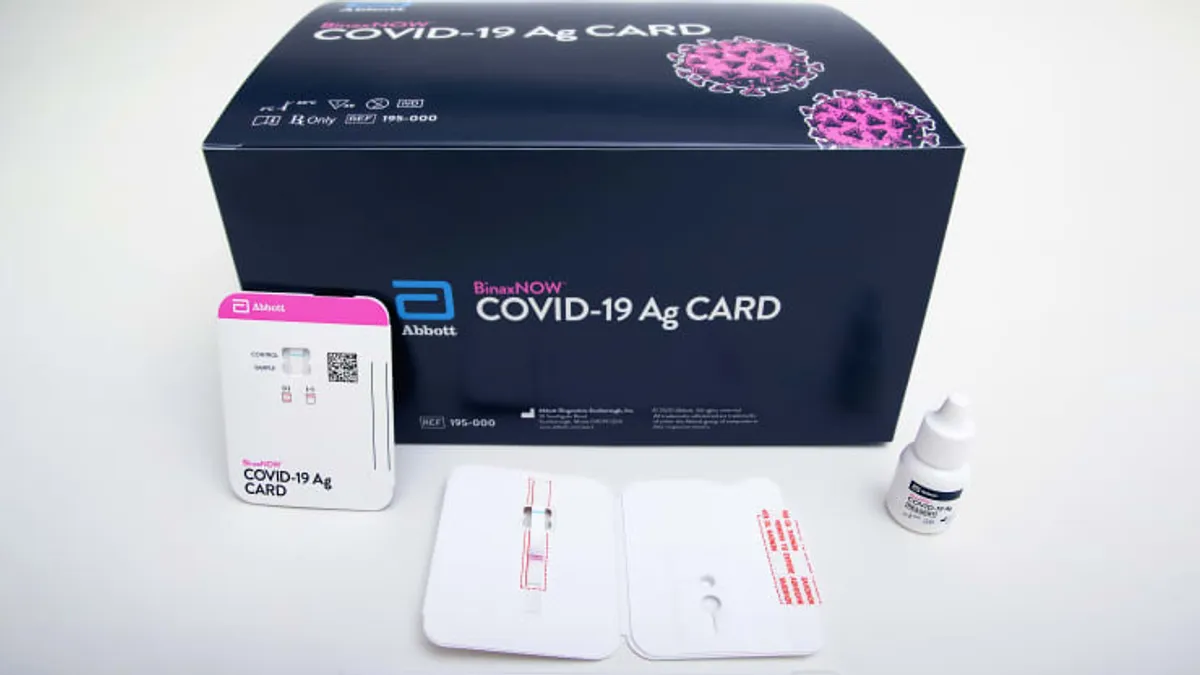Dive Brief:
-
Weekly testing of students and teachers with Abbott's BinaxNOW rapid antigen tests cuts in-school COVID-19 infections by up to 50%, according to a new pilot study.
-
The study, commissioned by The Rockefeller Foundation, piloted weekly antigen testing at K-12 schools in six U.S. cities including Los Angeles, New Orleans and Washington. The test had the biggest effect on infections when used to test both teachers and students at least every week in high schools.
-
However, the pilot identified barriers to the effective use, including limitations of Abbott's associated app and significant costs beyond the $5 paid for each test. New Orleans testing leads also noted in the study that the Abbott tests are not officially approved for use in children or in asymptomatic cases. "While we can hypothesize that antigen tests can solve the cost and time limitations of PCR testing, we have no idea how well the tests work in children," they said in the study.
Dive Insight:
President Biden wants to reopen schools in his first 100 days in office. Testing is part of the plan. Biden is seeking $50 billion for a "massive expansion of testing," including funding "to help schools and local governments implement regular testing protocols." The plan rests on a belief that regular testing can support safe reopening.
Yet, the use of antigen tests, which are less sensitive than PCR tests, in asymptomatic individuals remains controversial, in part due to worries that a high rate of false negatives nullifies any benefits of mass testing. To add data to the debate, The Rockefeller Foundation commissioned RAND Corporation and Mathematica to run a pilot that delivered 140,000 Abbott tests to six K-12 testing partners based on a memorandum of understanding in October with HHS.
The study found testing can reduce in-school transmission of the coronavirus, but only if done in a precise way. Only testing teachers was fairly ineffective, particularly if done infrequently. Even testing teachers twice a week was only associated with a 19% reduction in high schools and a 7% in primary schools. Testing students increased those figures to around 50% in high schools and 35% in primary schools, although again less frequent testing was associated with smaller reductions in transmission.
A 50% reduction in in-school transmission suggests asymptomatic testing of students and teachers may have value even if it misses some cases. An earlier CDC study put the sensitivity of BinaxNOW in infectious individuals at 78.6%, a figure that fell to 35.8% when all people who tested positive on PCR were included in the analysis.
The Mathematica research notes that "most students, parents, and staff were enthusiastic about a school-based testing program that could provide rapid results, even though antigen tests are less sensitive than PCR tests." However, at the same time, the study said Louisville, New Orleans and Tulsa "expressed concern that false positives resulting from these less accurate tests could have negative implications for students, who miss in-person instruction, as well as their caregivers, who may be forced to miss work to quarantine or care for their child."
FDA in November issued an alert to clinical laboratory staff and healthcare providers that false positive results can occur with antigen tests. However, issues other than effectiveness could also limit the use of antigen testing by schools.
The pilot project recommended twice-weekly testing at sites with moderate or high levels of risk but received pushback from administrators and parents. Some parents did not want to subject children to the discomfort of swabbing twice a week. Equally, administrators felt they lacked the resources to keep up a twice-weekly testing regime.
The resourcing issue touches on other barriers identified in the pilot. Abbott sells BinaxNOW kits for $5 but one site estimated the cost of administering the test was $80. The additional $75 covers labor, testing supplies, personal protective equipment and biohazardous waste removal. "Many school districts were not prepared for these costs and have not implemented clear guidelines for procuring the necessary supplies," the authors of the study wrote.
Some pilot sites also encountered resistance among staff to performing the test. BinaxNOW is authorized for use by anyone with a high school education who undergoes training but the testing lead for Louisville said "that's just not going to fly in our community." Sites needed to find nurses or other healthcare professionals to administer the test, in some instances due to the unwillingness of school administrators to take on the perceived risks of testing people.
The challenges continue once a test is performed. The authors of the report said schools need to consider where people will wait while their tests are processed and where results will be communicated. For positive tests, schools also need to inform individuals of the next steps, such as getting a confirmatory PCR test, and coordinate with other organizations handling lab-based testing and contact tracing.













